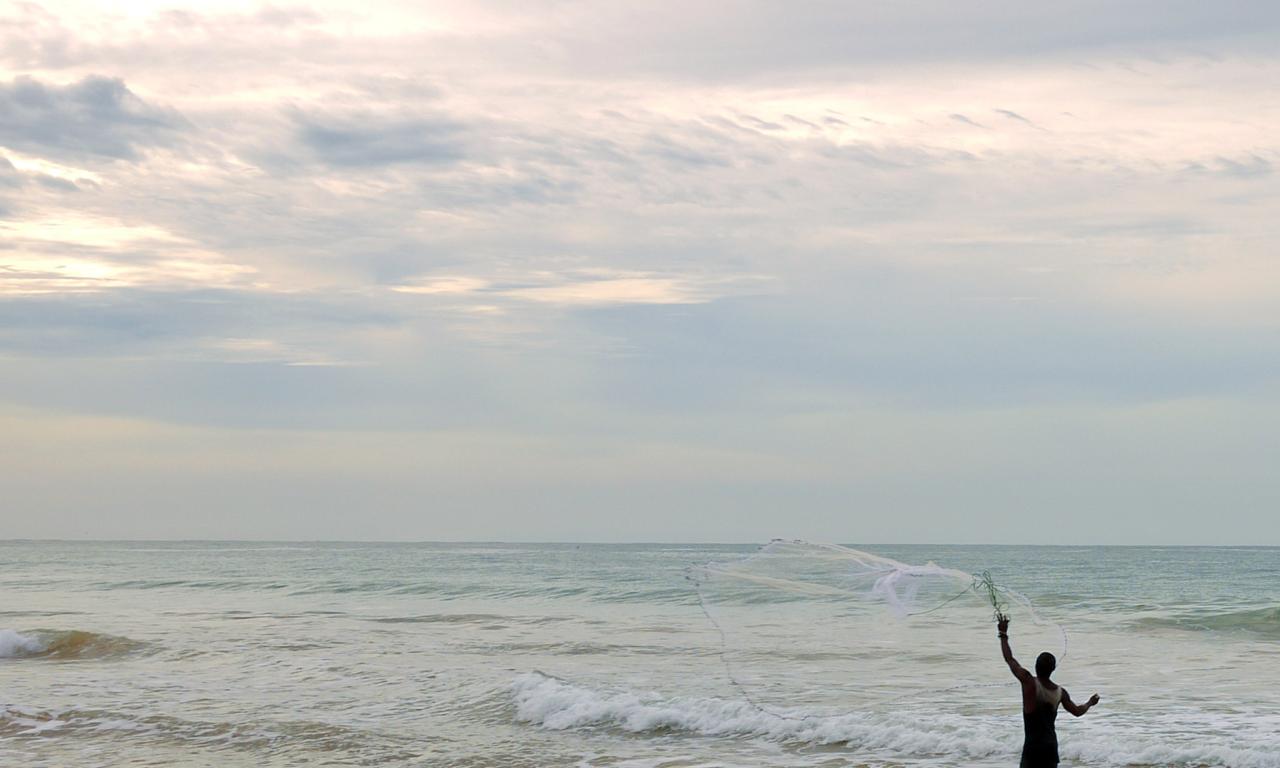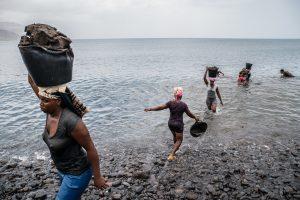
We are all ocean people, whether we live by the sea or not. Life on our planet arose from the oceans and over time the deep relations between humans and the sea have shaped our histories and cultures.
Covering over seventy percent of the Earth’s surface, oceans join us together while at the same time keep us apart. They supply us with freshwater and oxygen, influence our weather, provide food, and facilitate transportation and commerce.
Our diverse relationships with oceans surpass the material, delving into the intangible to feed the human psyche. Oceans shape cultural identity, a sense of place and belonging and they spark curiosity and awe. All this contributes significantly to human well-being at all scales from the individual and community to the national and global.
Fishers inshore and offshore, refugees attempting to cross the Mediterranean, beach and adventure tourists, seaside condominium buyers, oil rig workers, Ghanaian fish mammies, artists and oceanographers all have different interests, experiences, economic stakes, emotional investments and cultural and social ties to different aspects of our shared coasts and oceans.
People’s relationships with the ocean are in constant evolution. Pacific Island people and artisanal fishing communities in Asia have traditionally navigated using skills such as close reading of waveforms, cloud patterns, and detailed knowledge of stars, winds and currents to detect land and navigate unknown waters. Today, Pacific navigation skills are being revived as part of a Pacific cultural resurgence associated with voyaging, to ensure that these cultures and their relationship to the ocean continue to thrive and adapt to change.

However, when it comes to ocean governance these diversities in the human-ocean relationship are starkly absent. Ocean governance has slipped from the hands of the many into the few. Ruled by the powerful and well-resourced, smaller stakeholders are sidelined in political processes and market structures they need to nourish and support themselves. This inequality increasingly endangers ecological sustainability, inclusive economic development and long-term political and social stability.
Current ocean governance and management structures perpetuate over-exploitation and injustice. Just five countries dominate 86 percent of fishing in the high seas. Corporations are becoming more powerful than countries with 13 seafood companies controlling around 15 percent of the global catch. Unfairly, it’s the 47 million small-scale family fishers around the world who are suffering from ocean degradation despite being the least responsible for it.
Declining access to oceans and coastal areas due to privatization is detrimental to fishers and Indigenous Peoples and others who gain their livelihoods and sense of cultural identity from the seas. It also has impacts on people who visit the coast for relaxation, especially those from lower-income households who may not otherwise be able to access nature.
Discussions about the future of the ocean are too often dominated by ‘blue economy’ perspectives that focus only on the material goods and services the ocean can provide, asking ‘what more can we get from the ocean?’ Another dominant narrative asks, ‘what have people done to the ocean?,’ pointing to the negative impact of human pressures such as overfishing and pollution have on ocean health.
While both of these perspectives are important, neither account for the fundamental role oceans have played in shaping our societies and the diverse relationships that exist between people and oceans. Only through recognizing these relationships while keeping equity and inclusion at its center, can the ‘blue economy’ live up to its potential to nourish the livelihoods of current and future generations.
Only fair oceans can nourish current and future generations

There is much to do to make our seas fair. Equity is a prerequisite to achieving a sustainable ocean economy, however, ocean governance continues to be equity-blind and poorly implemented. The increasing impacts of climate change will only exacerbate hardships on already vulnerable nations and poor fishers. Thus, we urgently demand justice be considered in all sectors, at all political levels, and that policies to increase equity be urgently implemented.
We must reclaim the idea of the blue economy with narratives that motivate and inform political action. Narratives that celebrate the rich diversity of human social, cultural, cognitive and emotional relationships with the ocean to help broaden the political consensus around a sustainable ocean economy.
Ocean governance is humanity’s collective responsibility. It can only be achieved by ensuring all who have lived in, worked on and stewarded coastal and continental waters have a seat at the table. This means directly involving local, fishing and Indigenous communities from both the North and South when planning policy and market strategies. Maintaining ocean health and access should be core aims of governing future oceans.
A sustainable ocean economy must ensure that the potential gains in wealth from the development of new ocean industries are distributed to address social problems seen in more unequal societies. Policies to stimulate responsible business practices can help to redistribute wealth and access to resources that level the playing field. It is these equity-activating policies which are the base to inclusive access to knowledge, decisions, resources, and markets.
Policy, business and nonprofit leaders must make a clear commitment to tackle persistent and increasing inequalities on our seas and tap into the full range of human-ocean relationships if we are to secure a sustainable ocean economy.
Equity builds resilient communities and improves the adaptive capacity to turn the tide on ocean degradation. Now is the time for strong leaders to focus on the fairness our oceans need to flourish into the future.

This opinion piece is by the WorldFish Research Chair for Equity and Justice in the Blue Economy, Eddie Allison, and, WorldFish Honory Fellow, John Kurien, who were among the lead co-authors of The Human Relationship with Our Ocean Planet Blue Paper.
It’s part of a series of “Blue Papers” commissioned by the High Level Panel for a Sustainable Ocean Economy, a group comprising the heads of government from 15 countries. The papers aim to summarize scientific evidence and provide decision-makers with an overview of the challenges and opportunities for the sustainable use of ocean resources.
Related posts:
Only fair oceans can strengthen people and planet, argue researchers in new report
‘Sweet spot of connection’: Social movements, researchers, ENGOs eye opportunities and challenges around small-scale fisheries
Partnership promotes confidence in African fish
Against the tide: A FAD fit for Timor-Leste’s artisanal fishers
Fish and Aquatic Food Systems COVID-19 updates for May: India